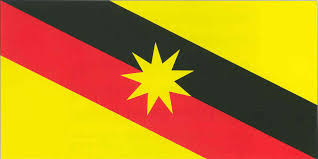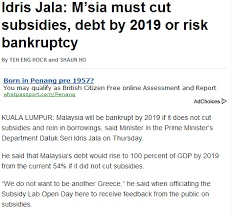In May 2010, Minister in Prime Minister's Department Idris Jala woke the nation up from its slumber by announcing that Malaysia will be bankrupt by 2019 if the government does not cut subsidies and rein in borrowings. By end of 2011 our National debt was at RM460 billon and still rising.
Then we were shocked by the findings of ecoomic think-tank MIER in in January 2012 that if nothing is done to reverse the current trends in government expenditures and revenues, extrapolation suggests that Malaysia’s national debt will explode to 100 per cent of GDP by 2019.
Yet UMNO-BN remains unconcerned about the matter, if not totally ignored it. Along the way we were shocked and still feel disgusted about the RM250 million NFC debacle, which Opposition Leader Anwar Ibrahim's PKR party exposed.
We are all also familiar with the countless scandals racked up by UMNO-BN during the past 56 years at the national level, but not much has been highlighted at the state level, as if all is well there.
Indeed, these are far from well and the mismanagement by an irresponsible UMNO-BN government has in fact left an everlasting and negative impact in every state in Malaysia. In fact, UMNO-BN has burdened the people in every state with some problem or other.
Success, stagnation or dismal failure?
As a verse from a patriotic song goes, “Dari Perlis hinggalah ke Sabah, kita sudah berjaya…” (We have been triumphant all the way from Perlis to Sabah), let us run through the states one by one and see how how each has actually fared. Can they claim to have 'berjaya' or succeeded?
 Perlis
Perlis is a small state without any natural resources. Besides fishing, jobs are scarce and development is intermittent. Perlis has not been developed and without enough money of its own, the people of Perlis are being held ransom to keep voting UMNO in order to survive. At one time, the Kangar municipal council had no money even to pay for the office they rented and the court ordered the building to be sealed. The jobs in the sugar cane and tobacco plantations have all been filled and extra hands are only needed periodically. Many in Perlis are jobless and the efforts by UMNO to provide employment end up only with enriching its cronies.
 Kelantan,
Kelantan, since being denied their oil royalty from Petronas by UMNO, has to survive on its own ingenuity. Twenty-six years after being promised the Kota Bharu-Kuala Krai highway by the Federal government, the PAS-led Kelantan has decided to go ahead and build it on its own. In the 1980s Kelantan was first denied fertilizers for its padi (rice) farmers, and then oil royalty. Even the fund given to Kelantan to resolve the water problem is not a federal grant, unlike in all the UMNO-BN states, but a loan and has to be repaid. Despite UMNO proclaiming itself to be struggling for race, religion and country, Kelantan which is a Malay homeland was denied all help and benefits by UMNO.
 Terengganu
Terengganu also experienced the same trouble with UMNO over oil royalty when it was ruled by PAS but even after receiving the royalty now, there is not much development either due to senseless spending on mega projects like the RM292mil sports stadium where the roof collapsed and had to be demolished. The feud between former chief minister Idris Jusoh and the current leader Ahmad Said has not helped. Terengganu has not benefitted substantially from the Monsoon Cup, one of Idris' trophy projects. The cost of staging the international yachting event was RM300 mil initially and has ballooned. It looks like the oil royalty received by Terengganu has been used to enrich UMNO leaders.
 Kedah,
Kedah, led by PAS, was an agricultural state, primarily growing padi. Kedah has no rich natural resources apart from its soil. But after the botched efforts by UMNO to develop it, Kedah is no more the “Rice Bowl” of Malaysia and the padi farmers are at the mercy of Bernas, a firm with a near monopoly over the rice trade and is controlled by a prominent UMNO crony.
Kedah's padi lands have been converted to residential, commercial and industrial lands and along the way, UMNO cronies enriched themselves from the resulting land transfers and construction projects while factory workers are paid low salaries. The previous landowners have spent their money and they too have to find other sources of income; many have turned to fishing and have to compete with the Thais. The original culture of Kedah state has changed.
The development programs put in by UMNO changed the main contributor to GDP from agriculture to manufacturing. This in itself is not the problem but manufacturing has now become very competitive and investors will go elsewhere to save costs and maintain profits. If you visit the Polimas in Jitra, the abandoned blue factories are a testimony to this.
Even in the Mahathir Mohamad days, with the factories and heavy industries like the Perwaja Steel and car assembly plants, jobs were limited. The present PAS government has inherited a badly-managed Kedah from UMNO-BN and has done well to manage to come out No. 5 out of 13 states in the chase for foreign direct investment. Selangor and Penang - two other Pakatan Rakyat states - topped the list.
 Penang,
Penang, led by DAP, has been denied federal funding and left to develop its own infrastructure. Like Kelantan, Penang has to find ways to rebuild its economy, while the fate of the second Penang Bridge was left at the mercy of UMNO. Even the decision to allocate RM50 million to Penang for conservation purposes was reversed, with federal government minister Rais Yatim saying that the money promised was a 'misconception'. The tourism industry in Penang too has been sidelined by the federal Tourism Ministry.
 Perak
Perak has experienced rare earth contamination and one of the victims died recently - a grim reminder to all of us. Even the once prosperous rubber and tin mining industry in Perak, which should have benefited from the recent boom in global commodity prices failed to see any revival. Now, tin mining is just a minor part of Perak’s economy. Rubber too has been replaced by oil palm, but this crop is facing fierce competition from other forms of edible oil produced internationally. The forests in Perak, once a source of scarce timber, seem to have disappeared too.
 Pahang
Pahang is now burdened by the Lynas rare earth refinery. The Najib govt does not seem to care about potential radioactive risks to the people in his home state. Money must have changed hands. There is talk of a mysterious RM50 million deposit paid by Lynas but no one seems to know who or which agency received the money. The forests in Pahang too have nearly gone and yet it is unable to develop economically despite the huge royalties earned from past timber harvesting activities.
Despite the casino in Genting Highlands and the vegetables-producing Cameron Highlands, it is very puzzling why Pahang still has not enough money and needs Lynas to come in. Was it due to desperation and greed that Lynas was invited to Pahang because other sources of income for the state have long been siphoned out and depleted.
 Malacca
Malacca is burdened with the various failed big projects that have been swept under the carpet by its chief minister Ali Rustam. The huge investments in several projects are mired with malfunctions, and the government is unable to get good returns as expected; namely the ferris wheel - Eye on Malacca that had to be scrapped, the frequently faulty monorail that has left many a tourist stranded, the Go-kart circuit that the people are not even interested in, the exorbitantly-priced Malacca planetarium that failed to attract many visitors except during the holidays, the wasteful extension of the Batu Berendam Airport runway, and the incomplete Arab City that failed to lure visitors.
Ali Rustam's failed ideas are so bad that the projects have all been put under wraps, which is why many people are not aware that these were actually meant to push Malacca to the forefront of the national economy. But the money has been spent, with nothing or little to show for it? Was there corruption too?
 Negeri Sembilan
Negeri Sembilan has not benefited from the RM250 million National Feedlot Centre, although the state has given land to the cattle breeding project. The Negeri Sembilan government has not even been able to enlarge the present road from Kuala Pilah to Seremban that is always jammed with traffic. The promised military city of Port Dickson by Bagan Pinang assemblyman, the ex-Menteri Besar Isa Samad, has not seen the light of day. The state government can’t even afford to hold the annual Pesta Port Dickson due to lack of funds, so what more Isa's 'military city'.
The tourism industry and the infrastructure needed to spearhead it have been stagnant despite the Negeri Sembilan Tourism Department organizing expensive promotional campaigns in Putrajaya last year which were criticized as being extravagant and wasteful. The FELDA schemes in Jelai, Palong and Bukit Rokan have not improved much and many second generation settlers are moving out. The industrial estates in Senawang and Nilai are slowing down and the much lauded development in Nilai due to its proximity to the Kuala Lumpur International Airport, LCCT and Formula One Circuit has resulted in many unsold and vacant houses.
 Selangor
Selangor, led by PKR, is being sabotaged by Syabas, the water supply concessionaire owned by senior UMNO member Rozali Ismail. Syabas has not been able to resolve the water loss due to leakages. It seems that the ulterior motive is to force Selangor to buy water from Pahang as the water transfer project, which is feasible, has been turned into a money-making scheme for UMNO and its croies. UMNO also hopes that the water shortages will make the Selangorians angry with the present Pakatan Rakyat government. UMNO also depleted the state coffers during the administration of disgraced former chief minister Khir Toyo, and the siphoning out of money by his government is still unfolding.
 Johore
Johore is under siege by foreigners in the Iskandar Region and that will make everything expensive to the locals. Since Iskandar is a huge area, the rural people will also be affected by the rise in cost of living because whatever source of income the rural folk have now won’t be able to cope with the price surge. The people in Johore have been fooled by the various mega projects as if these belonged to them. The actual fact is that these are promoted by the federal government to benefit the foreign investors and of course their cronies who are the ones who will get the contracts to develop and build Iskandar, not the Johoreans. What the locals get will be the low end, the trickle down effect, the crumbs so to speak.
 Sarawak
Sarawak is being held ransom by Taib Mahmud and UMNO-BN is not doing anything about it. Taib Mahmud has made Sarawak his own personal property and the natives and other locals are deemed without the brains and aptitude to be successful or deserving of any help and opportunity from the state goverment. Taib has arrogantly pointed out that Sarawak is only for those who have brains, leaving unspoken that those who qualified must be from amongst his family, relatives and cronies!
 Sabah
Sabah is the poorest state in Malaysia. The World Bank in Washington has confirmed through a new study that Sabah is not only the poorest state in Malaysia but it’s likely to stay that way for a considerable length of time given the current weak efforts in poverty eradication. Job is scarce in Sabah and yet it is swamped by at least 200,000 illegal immigrants. Many experts estimate the figure to be at least double and together the illegals are fighting with the state people for whatever meager crumbs that fall from the UMNO-BN's table.
What about the success stories?

Of course there are success stories, but these are the minimum support that UMNO-BN has given to each state to placate the people. Roads, schools, hospitals, housing, piped water and electricity supply are the necessities. These facilities are also the duty of the UMNO-BN to provide but the coalition does not see it that way. To UMNO-BN leaders, this is sheer generosity and efficiency on their part and the states should be grateful to them for the basics and keep voting them back into power.
However, it looks like the 56-year-old spell cast by the UMNO-BN over Malaysia is finally breaking. Whatever achievements in every state are never long lasting, the people now realize. They also wonder what has happened to all that money supposedly 'invested' on their behalf by the UMNO-BN so that their children and future generations will always have something to fall back on. It looks like there is nothing after all and everyone from Perlis to Sabah - with the exception of the Pakatan states - will have to start from scratch all over again.
Malaysia Chronicle




I doubt this is the case for Sabah. The world bank has failed to take into account the recent developments that has transpired in Sabah's economy.
ReplyDeleteSabah up to date has a total investment of more than RM13 billion in 2011 is ranked third after Sarawak and Penang.
DeleteIndustrial Development Minister Datuk Raymond Tan Shu Kiah said that according to the figures provided by Malaysian Investment Development Authority (MIDA), Sabah is not too far away from Sarawak which had recorded about RM14 billion in investment last year.
DeleteThe RM13 billion plus figure however has not taken into account the investment from the Oil and Gas industry meaning that the outlook for Sabah is very positive.
DeleteOn a seperate matter on the same subject, the Chief Minister Datuk Seri Musa Aman is pleased with the performance of poverty eradication programmes in the state but wanted all implementing agencies involved to further expedite the completion of projects entrusted to them, to allow the target groups to benefit from them as soon as possible.
DeleteMusa said he had directed all agencies to take the necessary action and continuously improve their mechanism to ensure all ongoing projects can be completed on time or ahead of schedule. The Chief Minister expressed his satisfaction with the implementation of the poverty eradication projects in Sabah.
DeleteThe Chief Minister said the state and federal governments had introduced various programmes to help improve the economy and livelihood of the poor listed under the e-Kasih. He said among the main programmes under the federal were 1Azam, 1Azam Monthly Allowance and Housing Assistance (PBR), while those under the state included Mini Estet Sejahtera, Ladang PPRT and Localised Economic Improvement Project.
DeleteIn addition, there are also five agropolitan projects – one each in Kota Belud, Pitas, Kemabong, Tongod and Beluran being implemented by SEDIA under the Sabah Development Corridor (SDC), involving a total allocation of RM239 million. On average, Musa said there were about 10,000 recipients of 1Azam Monthly Allowance every month in Sabah last year, involving a payment amounting to RM36 million.
DeleteAs of Feb 3, he said 2,397 new houses had been completed under phase one of the PBR programme, while another 308 of 350 units under the phase two had been built by the local authorities in the state.Under the PBR, a total of 2,531 projects to repair dilapidated houses were approved in 2011 with Giatmara as the implementing agency. So far 361 were completed and another 239 are under construction. For this year, 1,400 new houses and 1,992 reconstruction projects have been approved for the state.
DeleteThe state government has requested the 1,992 projects to be upgraded to new house category and we expect there will be an additional 600 units of new homes to be approved.According to Musa, 150 units of houses equipped with social amenities have also been completed using allocation contributed by FELDA under the Nala Aquaculture Project in Tungku, Lahad Datu.
DeleteSabah is still the poorest state in Malaysia?
ReplyDeleteSabah kini dah makin menbangun, ia bukan lagi negeri termiskin. moga Sabah akan terus berkembang.
DeleteLAHAD DATU: Sabah, which for the most parts was governed by the Barisan Nasional (BN), experienced major changes in its development and economic landscape since it attained independence through Malaysia in 1963, said Prime Minister Datuk Seri Najib Tun Razak.
ReplyDeleteHe said Sabah was no longer the poorest state in the country and in fact had huge potential to surge forward.
"Then (in 1963) probably more that 70 per cent of the people could be said to be poor, hardcore poor and destitute. However, Sabah now is no longer the poorest state in the country.
"According to statistics, the average per capita income of Sabah now lies in the middle when compared to the richest and poorest states," he said during a visit here.
Najib said this was the outcome of the national development agenda which was clear and effective and now included the National Transformation Programme that would bring about a brighter future for the people.
"We launched the National Transformation Programme because we wanted to change everything, like this Kampung Nala (which previously was only a mangrove swamp)," Najib said.
"We will not stop here...we will continue until we completely eradicate hardcore poverty. Before, there were about 30,000 people in Sabah who were poor but now there are only about 7,000 (still poor)," he said.
Najib said although there were some people who were still poor, the success of the BN government in tackling poverty could not be understated.-The Star
Pembangunan di Sabah semakin memberikan impact yang positif. Kemungkinan ini dari usaha kerajaan untuk memastikan yang mana sabah akan mencapai kemajuan pada akan datang.
ReplyDelete